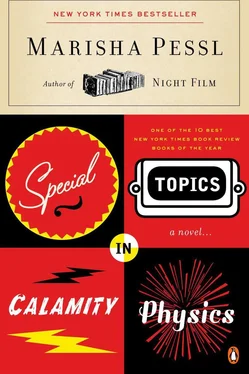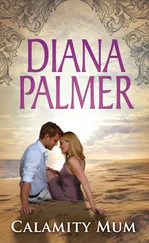I told Dad he’d lost his mind. He laughed.
“One day you’ll see,” he said with a wink. “And remember. Always have everything you say exquisitely annotated, and, where possible, provide staggering Visual Aids, because, trust me, there will always be some clown sitting in the back — somewhere by the radiator — who will raise his fat, flipperlike hand and complain, ‘No, no, you’ve got it all wrong.’”
I swallowed, staring down at the blank page. I triple-lutzed the ink pen in my fingers, my gaze falling out the window where, down in Harvard Yard, solemn students, winter scarves wrapped tightly around their necks, hurried down the paths and across the grass. “‘I sing of arms and of the man, fated to be an exile,’” Zolo had sung only a few weeks ago, bizarrely tapping his foot on every other word so the cuffs of his plaid pants raised and you caught an unwelcome glimpse of his toothpick ankles and dainty white socks. I took a deep breath. At the top of the page, I wrote in my neatest handwriting, “Curriculum,” and then, “Required Reading.”
That was always how Dad began.
Before I tell you about Hannah Schneider’s death, I’ll tell you about my mother’s.
At 3:10 P.M. on September 17, 1992, two days before she was to pick up the new blue Volvo station wagon at Dean King’s Volvo and Infiniti dealership in Oxford, my mother, Natasha Alicia Bridges van Meer, driving her white Plymouth Horizon (the car Dad had nicknamed Certain Death), crashed through a guardrail along Mississippi State Highway 7 and hit a wall of trees.
She was killed instantly. I would’ve been killed instantly too if Dad had not, by that strange, oily hand of Fate, telephoned my mother around lunch to tell her that she didn’t need to pick me up from Calhoun Elementary as she always did. Dad had decided to blow off the kids who always hung around after his Political Science 400a: Conflict Resolution class to pose ill-considered questions. He’d pick me up from Ms. Jetty’s kindergarten and we’d spend the rest of the day at the Mississippi Wildlife Conservatory Project in Water Valley.
While Dad and I learned that Mississippi had one of the best deer management programs in the country with a population of 1.75 million white-tailed deer (surpassed only by Texas), rescue crews were trying to extricate my mother’s body from the totaled car with the Jaws of Life.
Dad, on Mom: “Your mother was an arabesque. ”
Dad was fond of using ballet terms to describe her (other favorites included attitude, ciseaux and balancé ), in part because she trained as a girl for seven years at the famed Larson Ballet Conservatory in New York (quitting, per her parents’ wishes, to attend The Ivy School on East 81st Street) but also because she lived her life with beauty and discipline. “Though classically trained, early in life Natasha developed her own technique and was seen by her family and friends as quite radical for the era,” he said, alluding to her parents, George and Geneva Bridges, and her childhood peers who didn’t understand why Natasha chose to live not in her parents’ five-story townhouse near Madison Avenue but in a studio in Astoria, why she worked not for American Express or Coca-Cola, but for NORM (Non-profit Organization for Recovering Mothers), why she fell for Dad, a man thirteen years her senior.
After he’d had three shots of bourbon, Dad was known to talk about the night they met in the Pharaoh Room of the Edward Stillman Collection of Egyptian Art on East 86th Street. He saw her across a crowded room of mummified limbs of Egyptian kings and people eating duck at $1,000 a head with proceeds going toward a charity for orphaned children in the Third World. (Dad, quite fortuitously, had been given the two tickets by a tenured university colleague unable to attend. I can therefore thank Columbia Political Science Professor Arnold B. Levy and his wife’s diabetes for my existence.)
Natasha’s dress had a tendency to change colors in his memory. Sometimes she was “wrapped in a dove-white dress accenting her perfect figure, which made her as arresting as Lana Turner in The Postman Always Rings Twice .” Other times she was wearing “all red.” Dad had brought a date, a Miss Lucy Marie Miller of Ithaca who was a new Associate Professor in Columbia’s English Department. Dad could never remember what color she was wearing. He didn’t even remember seeing Lucy, or saying good-bye to her after their brief discussion about King Taa II’s hip’s remarkable state of preservation, because, moments later, he spotted the pale blond, aristocratically nosed Natasha Bridges standing in front of the knee and lower thigh of Ahmosis IV, chatting absentmindedly with her date, Nelson L. Aimes of the San Francisco Aimeses.
“The kid had the charisma of a throw rug,” Dad liked to recall, though sometimes in his accounts the unfortunate Mr. Aimes was only guilty of “weak posture” and “a hedge of a hairline.”
Theirs was a brutal romance of fairy tales, replete with wicked queen, bungling king, stunning princess, impoverished prince, a love that was enchanted (caused birds and other furry creatures to congregate on a windowsill) — and one Final Curse.
“You vill die unhappy vith him,” Geneva Bridges allegedly said to my mother during their last telephone conversation.
Dad was at a loss when asked to articulate exactly why George and Geneva Bridges were so unimpressed with him when the rest of the world was. Gareth van Meer, born July 25, 1947, in Biel, Switzerland, never knew his parents (though he suspected his father was a German soldier in hiding) and grew up in a Zurich orphanage for boys where Love ( Liebe ) and Understanding ( Verständnis ) were as likely to make personal appearances as the Rat Pack ( Der Ratte-Satz ). With nothing but his “iron will” pushing himself toward “greatness,” Dad earned a scholarship to the University of Lausanne to study economics, taught social science for two years at the Jefferson International School in Kampala, Uganda, worked as Assistant to the Director for Guidance and Academics at the Dias-Gonzales School in Managua, Nicaragua, and came to America for the first time in 1972. In 1978, he earned his Ph.D. from Harvard’s Kennedy School of Government, completing a highly regarded dissertation, “The Curse of the Freedom Fighter: Fallacies of Guerrilla Warfare and Third-World Revolution.” He spent the next four years teaching in Cali, Colombia, and then Cairo, while in his spare time conducting fieldwork in Haiti, Cuba and various African countries, including Zambia, Sudan and South Africa, for a book on territorial conflict and foreign aid. Returning to the United States he became a Harold H. Clarkson Professor of Political Science at Brown, and in 1986, an Ira F. Rosenblum Professor of World Order Studies at Columbia University, also publishing his first book, The Powers That Be (Harvard University Press, 1987). That year he was awarded six different honors, including the Mandela Award of the American Political Science Institute and the esteemed McNeely Prize of International Affairs.
When George and Geneva Bridges of 16 East 64th Street met Gareth van Meer, however, they didn’t award him any prizes, not even an Honorable Mention.
“Geneva was Jewish and she loathed my German accent. Never mind that her family was from St. Petersburg and she had an accent too. Geneva complained that every time she heard me she thought of Dachau. I tried to curb it, an effort that brought me to the squeaky clean accent I have today. Ah, well, ” Dad sighed and waved in the air, his gesture of When All’s Said and Done. “I suppose they didn’t think I was good enough. They had plans to marry her off to one of those pretty boys with hair mannerisms and a preponderance of real estate, someone who hadn’t seen the world, or if he had, only through the windows of a Presidential Suite at the Ritz. They didn’t understand her.”
Читать дальше












